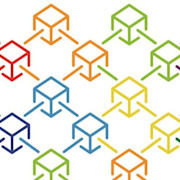- Science News
- Frontiers news
- Can blockchain help science bring us better, cheaper and faster results?
Can blockchain help science bring us better, cheaper and faster results?

There have never been more scientists alive today but it doesn’t mean doing science has gotten any easier. Reports suggest that there’s a high degree of fear among scientists of being scooped. There’s also the difficulty in reproducing data in a number of disciplines. In 2015, it was estimated that 20% of US health science can’t be replicated or reproduced.
But blockchain could provide a solution to all these problems.
How can blockchain support great science?
Blockchain and related technologies promise to create a system based on trust where each transaction involved in a production process is recorded and verifiable. The end-product can then be traced back to its source. This method of providing trust at scale is now being adopted by researchers and scientists with potential to add value at all stages of data gathering and sharing.
Sign up to article alerts to receive the latest research
Sean Manion, Specialty Chief Editor of Blockchain for Science says the most significant impact of blockchain could be how data is handled in research:
“Most of the problem is not any sort of malicious fraud, but simply noise in the system and a scaled world of research that has incentives that are sometimes misaligned with the overall mission of advancing human knowledge and discovery,” he explains.
“Blockchain allows us to have a far more trackable, auditable system of data that we can turn into knowledge. This interconnects with us being able to track intellectual property and research contributions in a way that will accelerate data sharing without the concerns of being scooped. This will have the overall impact of better science and faster research findings.”
Leading experts
Specialty Chief Editors Soenke Bartling (founder and CEO, Blockchain for Science), and Sean Manion (co-founder and CEO, Science Distributed), will address blockchain and related distributed ledger technologies applied to science, research and knowledge creation.

Sean Manion
Sean Manion, a neuroscientist by training, was introduced to blockchain for science whilst overseeing a clinical research network, where he was able to efficiently partner researchers together to facilitate new projects based on a relationship of mutual trust. But to extend this to more scientists, he needed to find a way to scale that trust network: the solution came with blockchains. This led to Science Distributed: a platform which facilitates connections between scientists to bring blockchain to health research for “better science, cheaper research, and faster miracles.”

Soenke Bartling
Soenke Bartling has a background in radiology and is a strong advocate for open science through blockchain. His Think Tank also called Blockchain for Science focuses on research for blockchain as a tool to make science truly open. He like Sean Manion sees blockchain as a tool to tackle multiple research challenges from funding distribution within research to reproducibility of data.
A new opportunity for research in Blockchain for Science
Blockchain for Science will cover empirical and theoretical applications of blockchain to all research fields. Information on the challenges in each field is encouraged: limitations on data standards, complexity of data and workflows, along with regulatory, administrative, cybersecurity, and other hurdles.
The article collection Blockchain for Distributed Research led by Sean Manion, Tiffany Gray, Yauheni Solad and Natalie Marler is now open for submissions as is Blockchain, Scholarly Communication, and the Social Fabric of Science led by Dean Korošak and Jason Potts
Other article collections in Blockchain for Science are coming soon…
Follow Frontiers in Blockchain on Twitter
Frontiers journals lead in citations and rank in top Impact Factor and CiteScore percentiles. See full analysis







